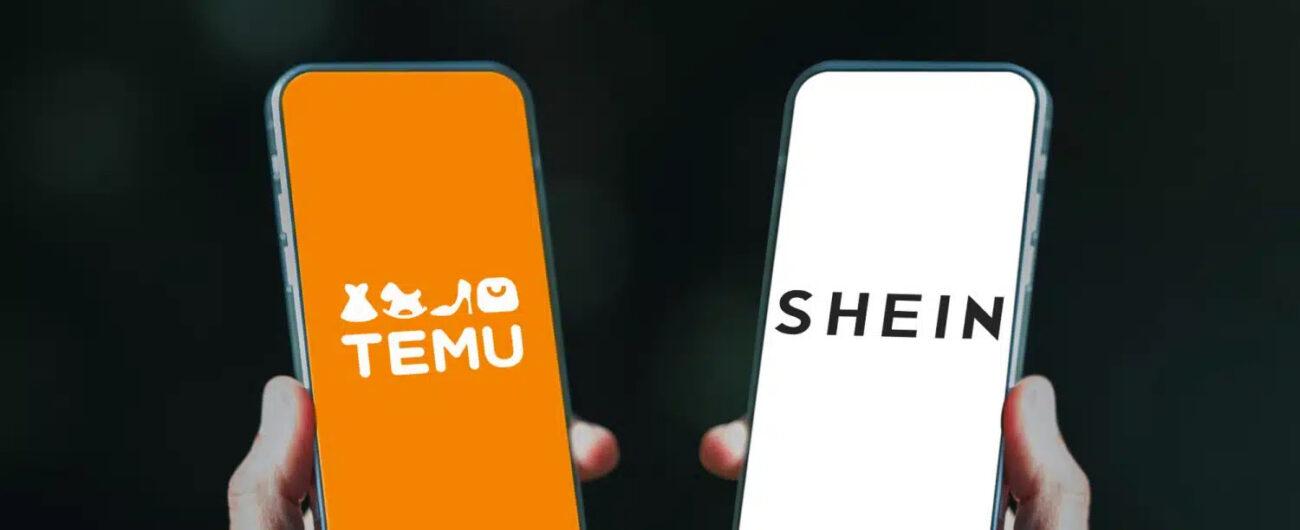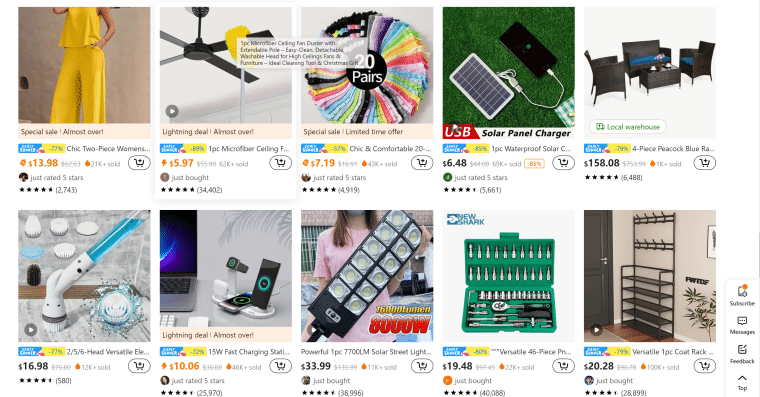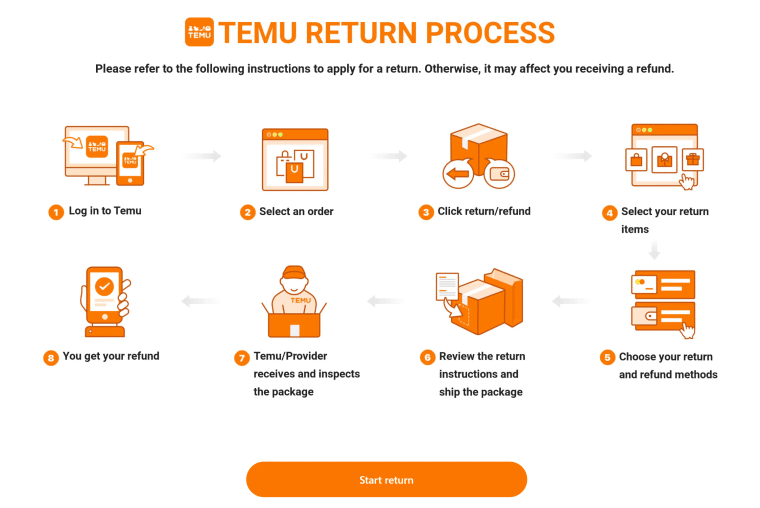Temu vs Shein: Which Ecommerce Titan Is Better?

The Temu vs Shein controversy is spicier than you might have imagined. The two Chinese ecommerce behemoths aren’t just battling it out for consumer dollars — they are also at war in the courtroom. Temu (along with several other entities) has accused Shein of breaking all sorts of laws, threatening suppliers, and using other dirty tactics to maintain market dominance.
In this Temu vs Shein debate, we’ll give you a rundown of these two platforms so you can decide for yourself which one aligns with your shopping needs. We’ll also provide some more insights into the swirling controversies around both companies.
Temu vs Shein: Introducing the Titans of Ecommerce
Shein is the older of the two platforms; it was founded in 2008 by Chinese entrepreneur Chris Xu. In just 16 years, the platform has exploded in popularity, boasting tens of billions in revenue and nearly 100 million active shoppers.
Temu is a much newer player, launched by PDD Holdings in late 2022. Despite hitting the scene 14 years after Shein, Temu quickly established itself as a popular online marketplace, largely due to its affordable pricing, express shipping, and a broader range of offerings, including everything from pet supplies to trend clothing. The platform also has over 70 million active U.S. users.
Both Temu and Shein leverage online-only business models and rely on complex global supply chains to deliver affordable goods fast. However, each company’s business model focuses on a different scope of goods.
Shein has framed itself as a fast fashion company. Its business practices prioritize offering affordable fashion goods that are in line with the latest fashion industry trends. Conversely, Temu offers more products. If you’ve got your sights set on something other than the latest clothing items, Temu is probably more in line with your shopping needs.
Recently, Temu has begun to pull ahead of Shein in terms of total revenue. While this shift may be temporary, it could also be a sign that consumers find better value and more options on the newer platform.
Temu vs Shein: Product Quality Comparison
Both Temu and Shein are best known for their incredible prices and variety so it shouldn’t be all that shocking that the quality of many of the products they sell is relatively poor compared to Amazon, Walmart, and other top US-based ecommerce marketplaces.
Temu offers just about everything you can imagine and much more. You can buy a simple toolset, a strangely specialized ceiling fan mop, and even absurdly bright portable lights, all at extremely low prices.

Shein also has an exorbitantly large catalog, even though it’s mostly known for its clothes and apparel. You can buy electronics, home goods, car accessories, appliances, and much more.
Temu and Shein have gained huge followings of consumers, which means their products probably aren’t too bad in terms of quality. However, most people are willing to lower their quality standards a bit if they are getting an excellent deal on an item they want. Therefore, it can be tough to get a gauge on which platform has better products.
Another variable at play is the complexity of each platform’s supply chain. Most of the goods they sell are produced by third-party entities, which means the quality of the items you receive from both platforms can range from exceptional to mediocre. There have also been complaints about some products not matching the description or images on the website.
One of the biggest factors influencing quality is the price war between Temu and Shein. Providers have to sell products at the lowest prices possible, which means they are often working with razor-thin profit margins. This can prompt some manufacturers to cut corners and reduce product quality.
For a deeper glimpse into product quality, we suggest checking out reviews and feedback from people who have used both platforms. If possible, read reviews about the specific products you are thinking about ordering. You’ll likely see a broad mix of responses, from satisfied clients to those who are angry about the quality, consistency, and even the color of the items they received. Watch out for suspicious reviews or products with only 5 star and 1 star reviews as all ecommerce platforms including Temu and Shein struggle with floods of fake reviews.
The good news is that both platforms have reasonably accommodating return policies, so you can almost always send an item back if it doesn’t align with what you want or need. However, make sure you carefully read the return rules for the items you are ordering.
Temu vs Shein: Which Is Better for Shoppers?
When you’re considering which platform offers a superior shopping experience, weigh what each company does well and where it falls short. Temu offers a broader inventory that includes categories like home goods, pet supplies, clothing, and accessories. You can even find just about any kind of electronics and sports apparel in Temu too.
The overall shopping experience on Temu can be pretty fun as well. The company has gamified shopping, which has helped it maximize its brand power. Using the app will probably make it feel a lot like playing your favorite mobile game. The platform has bright graphics, lots of pop-ups, and plenty of things to keep your attention.
The checkout process is pretty simple. You can add items to your cart, place your order, and get updates on shipping estimates, all with a few clicks.
On the other hand, Shein specializes in affordable clothing and accessories. While its product range may not be as extensive as Temu’s, Shein excels in curating trendy fashion items at budget-friendly prices. You can also buy a massive range of random products there as it has recently expanded to most ecommerce verticals in its battle vs Temu. Over time, the app will become better at suggesting clothing and apparel in line with your sense of style.
Overall, the Shein app and web browser are quite user-friendly. They aren’t as gamified as Temu’s app, but the experience is basic and simple with fewer popups which can get annoying.
The question of which is better boils down to what types of products you are looking for. If you want cheap goods outside of the clothing niche, go with Temu. If you want trendy but cheap clothing that you may not be able to find in stores, check out Shein. You might as well search both platforms for what you want and choose from there.
Temu vs Shein: Shipping and Delivery Times
Okay, so now we know that the product quality can be so-so, the shopping experience is seamless on both platforms, and the goods are cheap. But what about shipping times? After all, saving a few bucks is much less appealing if you’ve got to wait weeks for your items to arrive.
Admittedly, neither Shein nor Temu stack up against Amazon Prime’s lightning-fast shipping. You aren’t going to see any next-day delivery options (with maybe a handful of rare exceptions). However, both platforms often offer reasonable fulfillment times and cheap or free shipping.
Temu offers free shipping for all orders though its free option is quite slow. If your purchase exceeds certain spending thresholds, you may even be eligible for free express shipping. Shein will take care of your shipping costs too, provided that you meet the minimum purchase threshold. If you want express shipping, you’ll have to pay an extra fee.
Typically, Temu products will arrive in 7 to 15 business days though deliveries are often delayed and they can sometimes take 3-5 weeks or more. If you pay for faster shipping, you can get your goods in less than a week (usually). Shein shipping times are similar.

In the middle of 2023, Shein announced that it was expanding overseas to cut down delivery times. While these steps have helped to improve shipping timetables, Shein is still working on its expansion, which means deliveries can still be a bit spotty.
The bottom line is that you shouldn’t rely on either platform for last-minute gifts or to pick up an outfit for that special event this weekend. You’ll need to plan a couple of weeks ahead, even if you are okay with paying for express shipping. Both of these platforms are known for delivery delays, so don’t bank on your order arriving early (or on time, for that matter).
Temu vs Shein: Return Policies and Customer Service
Both Shein and Temu have return policies in place. Like any big company, they also have customer service departments dedicated to dealing with product issues. However, the quality and efficiency of these services are spotty at best and downright frustrating at worst.
The return policies of each company are pretty restrictive, too. With Shein, you’ll have up to 35 days after the purchase date to return an item. Items are eligible for return only if they are in “new, unworn, unwashed, undamaged, and unaltered condition.” Additionally, the company requires you to have the original tags attached, as well as the hygiene sticker if one was included.
Basically, you need to carefully inspect the item you receive before removing any tags or wearing it. If you’ve got any concerns, initiate the return process right away.
Temu’s policy is nearly identical. As long as you haven’t washed, worn, or damaged the items and the tags are still attached, you can send them back. The major difference is that Temu gives you 90 days to initiate the return process. All you have to do is navigate to the Temu return page and click “Start Return” and it will walk you through the process step-by-step.

The good news is that you should know if there’s a problem with your product well before the 90-day mark. Just don’t get too excited and rip off any tags or packaging before inspecting your item. Otherwise, you’ll be stuck with it.
Temu vs Shein: Which Is Better for Sellers?
If you’ve got affordable goods that you want to sell to a wide range of consumers, you might be thinking about listing on one of these two platforms. In that case, Temu is probably the better option, unless you deal in fast fashion.
Through Temu, you can ship products directly to consumers and reach the platform’s millions of active users. Getting listed on Shein can be tougher, as the company works almost exclusively with Chinese clothing factories.
Even if you do have a chance to work with Shein, you might not want to. Temu and other companies have accused Shein of intimidating suppliers. In its complaint filed with the US District Court for the District of Massachusetts, Temu alleged that its competitor had imposed fines on suppliers and forced them into exclusive arrangements.
If you decide to partner with either entity, have a legal professional carefully review any contracts to ensure that your brand and products are protected. Also, explore alternatives to ensure you are making the best decision for your business.
Temu vs Shein: Controversies and Concerns
The world of ecommerce is ultra-competitive, especially for major players like Temu and Shein. After all, they are fighting for market share in similar niches and are already stuck behind the behemoth that is Amazon. Inevitably, this competition has led both brands to cut some corners in terms of sourcing, fair labor practices, and compliance.
Here’s a closer look at the laundry list of controversies surrounding Shein, as well as the growing allegations against its newer counterpart.
Allegations Against Shein
Shein has faced all sorts of allegations and has been the subject of several lawsuits, including the aforementioned case filed by Temu. This ominous filing made claims that Shein threatened suppliers with fines and forced them into exclusive agreements. If true, the allegations could explain how Shein has maintained such a strong foothold in the ultra-fast fashion space.
Manipulating suppliers into exclusive agreements restricts other companies’ access to the market and can also artificially impact pricing. It also hurts Temu, as the company would have a limited ability to expand its product offerings.
The scandals don’t end there for Shein. A group of designers filed a suit against Shein for stealing artists’ works using artificial intelligence and breaking Racketeer Influenced and Corrupt Organizations (RICO) laws. According to the lawsuit, the designers claimed that Shein had used its design algorithm to create exact copies of content produced by independent artists.
The claimants stated that the theft had damaged their careers and interfered with their long-term earning potential. They also alleged that the exact duplicates of their work infringed upon copyrights.
Unfortunately, the plaintiffs have had trouble seeking justice, as Shein has a decentralized infrastructure, which makes it hard to file claims and identify responsible parties. That is part of the reason why the designers claimed RICO violations, which can address the misconduct of individuals who are acting in the interest of a larger enterprise. RICO laws are helpful here because they were created to help bring down the Mafia and other criminal syndicates that are hard to prosecute otherwise.
Still, the plaintiffs are facing an uphill battle in their fight for justice and fair compensation for their work. This is just the latest in a longstanding string of misconduct claims, demonstrating Shein’s loose approach to fair trade laws.
Temu Scandals
While Shein has been at the center of numerous controversies, Temu is by no means faultless. In fact, it’s been wrapped up in several major scandals itself, encompassing everything from consumer privacy violations to forced labor and tax evasion. That’s quite a list of offenses for a company that is only a couple of years old.
In mid-2023, the company was accused of using forced labor in its Chinese production lines. The company has also faced class-action lawsuits for its questionable policies regarding consumer data protection and lax cybersecurity posture.
If you search the company on the Better Business Bureau (BBB) website, you’ll see hundreds of complaints. Temu also has an abysmal score of 2.5/5 and a C+ rating from the BBB. It is not BBB accredited.
Which Ecommerce Platform Is Better?
Ultimately, your choice of platform is a personal decision based on your individual needs. Temu has a broader mix of products, free return shipping, and free deliveries on all orders. However, if you are interested in faster shipping options and you are primarily focused on the latest fashion, Shein may be a better fit.
Regardless of which option you choose, carefully review product descriptions and return policies, just in case the item you receive doesn’t match your expectations. Also, remember that neither platform will accept items that have been worn or washed or had the tags removed.
Want to see how these platforms stack up to other ecommerce solutions? Check out our Temu vs Wish comparison for even more insights about popular and budget-friendly ecommerce brands.
Thanks for reading! Do you want to create thought leadership articles like the one above? If you struggle to translate your ideas into content that will help build credibility and influence others, sign up to get John’s latest online course “Writing From Your Voice” here.



